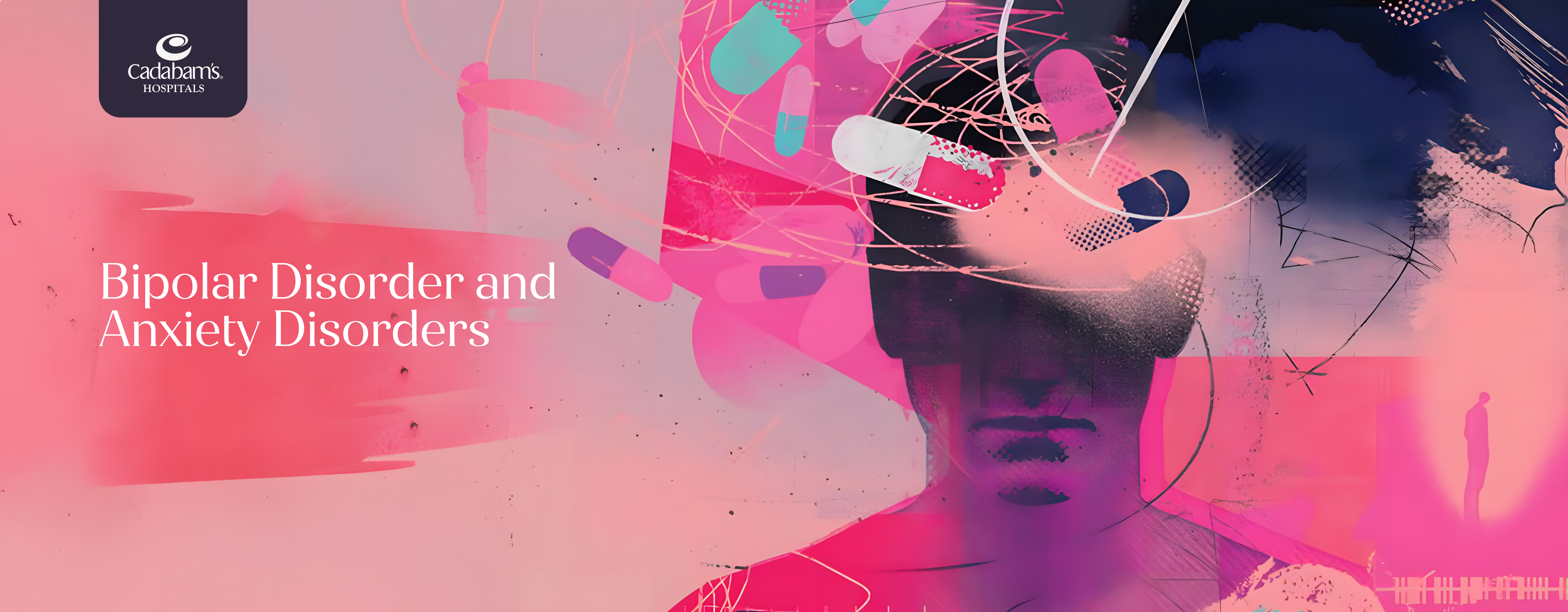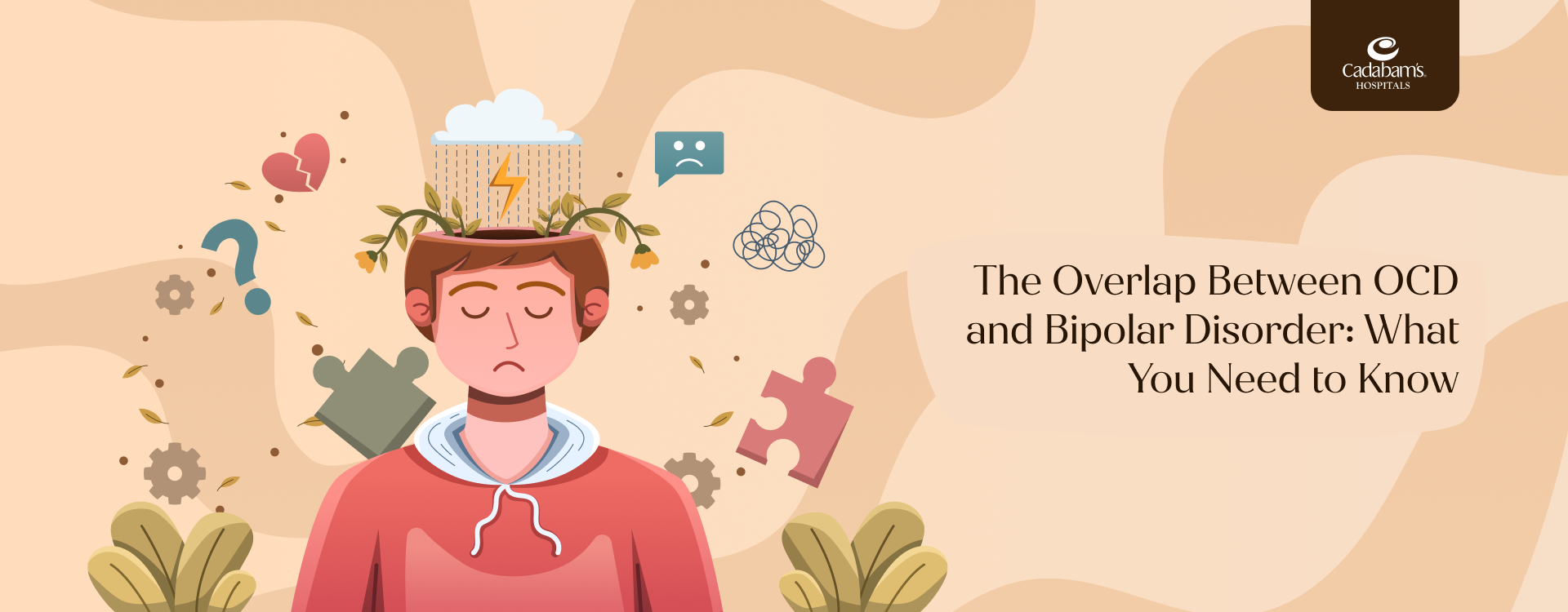Benefits of Psychotherapy for Bipolar Disorder
Bipolar disorder impacts both the person and others around them. Psychotherapy is a powerful tool to improve daily functioning and managing symptoms. Here are some of the benefits of psychotherapy.
Reducing Bipolar Disorder Symptoms
Certain risk factors fuel bipolar disorder and Cadabam’s psychotherapy can help individuals understand the nature of the condition and develop healthy coping skills to manage and reduce the symptoms without overwhelming them.
Learning to Handle Stress Better
Stress can trigger bipolar disorder and many other mental health conditions. Therefore, our psychotherapy equips individuals with effective skills to manage stress healthily by incorporating strategies like communication techniques, assertive training, or relaxation techniques like deep breathing and meditation.
Boosting Social Skills and Relationship Building
The therapists at Cadabam’s help individuals learn more constructive conflict resolution techniques and positive communication skills by using techniques like family therapy or group therapy. This group setting provides encouragement and accountability. As a result, they can build trust and improve social skills that support long-term recovery.
Reducing Relapse Rates and Promoting Long-Term Recovery
Therapy also teaches individuals how to identify and manage high-risk situations, further reducing the risk of relapse. Our psychotherapy addresses the underlying issues and causes of bipolar disorder and provides tools that can be used to identify triggers and warning signs. This could enable early intervention and medication adjustment, averting a complete relapse.
Types of Psychotherapy Used in Bipolar Disorder Treatment
Various types of psychotherapies are used in the management of bipolar disorder. However, the techniques used in these therapies can vary depending on the severity levels and the symptoms of each individual.
Cognitive Behavioural Therapy (CBT) for Bipoalar Disorder
The goal of this therapy is to recognise and alter the thinking patterns that accompany mood swings in patients with bipolar disorder. It helps them to transform a negative thinking process into a healthy one that improves their mood.
Family Therapy for Bipolar Disorder
Family member involvement is crucial in the healing process. Therefore, our family therapy incorporates them in the therapy sessions to help them understand and manage the conditions better.
Social rhythm Therapy for Bipolar Disorder
Oftentimes, they lack a healthy diet and sleep hygiene which are essential to manage bipolar disorder. Our social rhythm therapy assists the individual in developing routines and encouraging them to stick to a consistent sleep schedule, which promotes predictability and stable moods.
Psychodynamic Therapy for Bipolar Disorder
Our psychodynamic therapy explores the unconscious mind and how relationships and events from the past may impact bipolar symptoms. It looks at defence mechanisms and emotional patterns that could lead to mood fluctuations. Using this method can assist in creating a personalised treatment plan that addresses each patient’s specific symptoms.
Integrative Psychotherapy Techniques for Bipolar Disorder
Integrative therapy combines techniques from various approaches to create personalised treatment plans. It may use cognitive behavioural therapy (CBT) to change negative thinking patterns and mindfulness practices to enhance self-awareness and emotional regulation.
Our psychodynamic therapy can also explore underlying emotional issues. This comprehensive approach addresses multiple aspects of bipolar disorder, promoting overall well-being.
Group Therapy and Other Approached for Bipolar Disorder
Group therapy offers a supportive environment where individuals can share experiences, find common ground, and learn from each other. This group setting therapy encouragement throughout the recovery process.
Other methods involve psychoeducation, which provides individuals with essential knowledge about bipolar disorder, along with guidance on medication management and self-care techniques.
Customised Psychotherapy Treatment Plans for Bipolar Disorder in Hyderabad
We recognise that bipolar disorder is a deeply personal experience and requires a tailored approach rather than a universal solution. Therefore, at Cadabam’s Hyderabad, our experienced therapists collaborate with you to create a customised treatment plan that meets your specific needs and goals.
Using evidence-based methods such as CBT, family therapy, and mindfulness training, we aim to:
- Identify and manage mood triggers
- Develop healthy coping strategies
- Improve communication and relationships
- Reduce relapse risks and support long-term stability
Integrating Psychotherapy with Comprehensive Bipolar Disorder Care
Our multidisciplinary team adopts a comprehensive approach that treats both medical and psychological issues. Early diagnosis allows for more effective therapy, resulting in better symptom control and a higher quality of life. It also equips you with tools to manage stress, identify triggers, and build healthy coping mechanisms.
Find the Best Psychotherapy for Bipolar Disorder Patients in Hyderabad
If you’re looking for the best psychotherapy in Hyderabad to treat bipolar disorder for yourself or a loved one, Cadabam’s Hyderabad is an excellent choice. Our professionals can carry out the necessary interventions since they are skilled and prepared.
We use cutting-edge technology and evidence-based strategies to train and provide them with effective coping mechanisms so they may manage their symptoms without overwhelming others. Throughout our sessions, we respect everyone’s feelings in a nonjudgmental and encouraging setting.
Cadabam’s: Redefining Bipolar Disorder Psychotherapy in Hyderabad
The fight against bipolar disorder is complicated, and Cadabam’s Hyderabad is changing the way we approach it. By providing individualised psychotherapy that addresses the underlying reasons for bipolar disorder rather than just its symptoms, we go beyond standard treatment.
Our Expertise in Advanced Psychotherapy for Bipolar Disorder
Not only is our staff of experts highly qualified, but they also have a strong desire to remain at the forefront of bipolar disorder treatment. Modern evidence-based treatments including family therapy, CBT, and mindfulness training are employed by us to treat the underlying factors and challenges associated with bipolar disorder.
Assessment and Personalised Treatment Planning for Bipolar Disorder
We are aware that there isn’t a single bipolar disorder treatment. We’ll collaborate with you to develop a customised treatment plan that takes into account your unique requirements and objectives through thorough assessments. By working together, you can take charge of your rehabilitation process.
State-of-the-Art Facilities and Supportive Environment for Bipolar Disorder
We feel that your comfort and safety are most important. Our Hyderabad location provides an advanced atmosphere that promotes healing and growth. You’ll discover dedicated therapy rooms, comfy rest areas, and a supporting team to help you every step of the journey.
Ongoing Support and Monitoring for Bipolar Disorder
At Cadabam’s Hyderabad, we are dedicated to your long-term success because bipolar disorder is a long battle. We provide continuing assistance and monitoring to help you overcome obstacles, identify triggers, and stay on track to prevent relapsing.
Comprehensive Care Approach at Cadabam’s for Bipolar Disorder
We support treating the individual as a whole. Our psychotherapy services are combined with other evidence-based treatment options like medication-assisted treatment and support groups to offer an integrated approach to care that considers all facets of your health.
FAQs
How does psychotherapy contribute to bipolar disorder treatment?
You can create healthy behaviours to avoid relapse, learn coping techniques for cravings and triggers, and comprehend the underlying causes of bipolar disorder through our psychotherapy.
What should patients expect during their first psychotherapy session?
The therapist will get to know you, discuss your treatment goals, and respond to any questions you may have. They may suggest several other tests to avoid misdiagnosing with other conditions. It’s an opportunity to become comfy and consider your alternatives.
How does Cadabam’s ensure a personalised approach in psychotherapy for each patient?
Our therapists conduct thorough examinations to personalise treatment regimens to your specific needs and goals. They provide a variety of evidence-based therapies and collaborate with you to support your recovery journey.
How effective is Psychotherapy for Bipolar Disorder?
Psychotherapy is effective in learning about the signs and symptoms of bipolar disorder and ways to manage the symptoms that help the patient live a functional and better quality of life.
How many numbers of sessions are required?
The number of sessions depends on the person’s severity of the condition and how long they take to learn to manage their symptoms and be able to manage different areas of their life while continuing medications.














 Available
Available



















